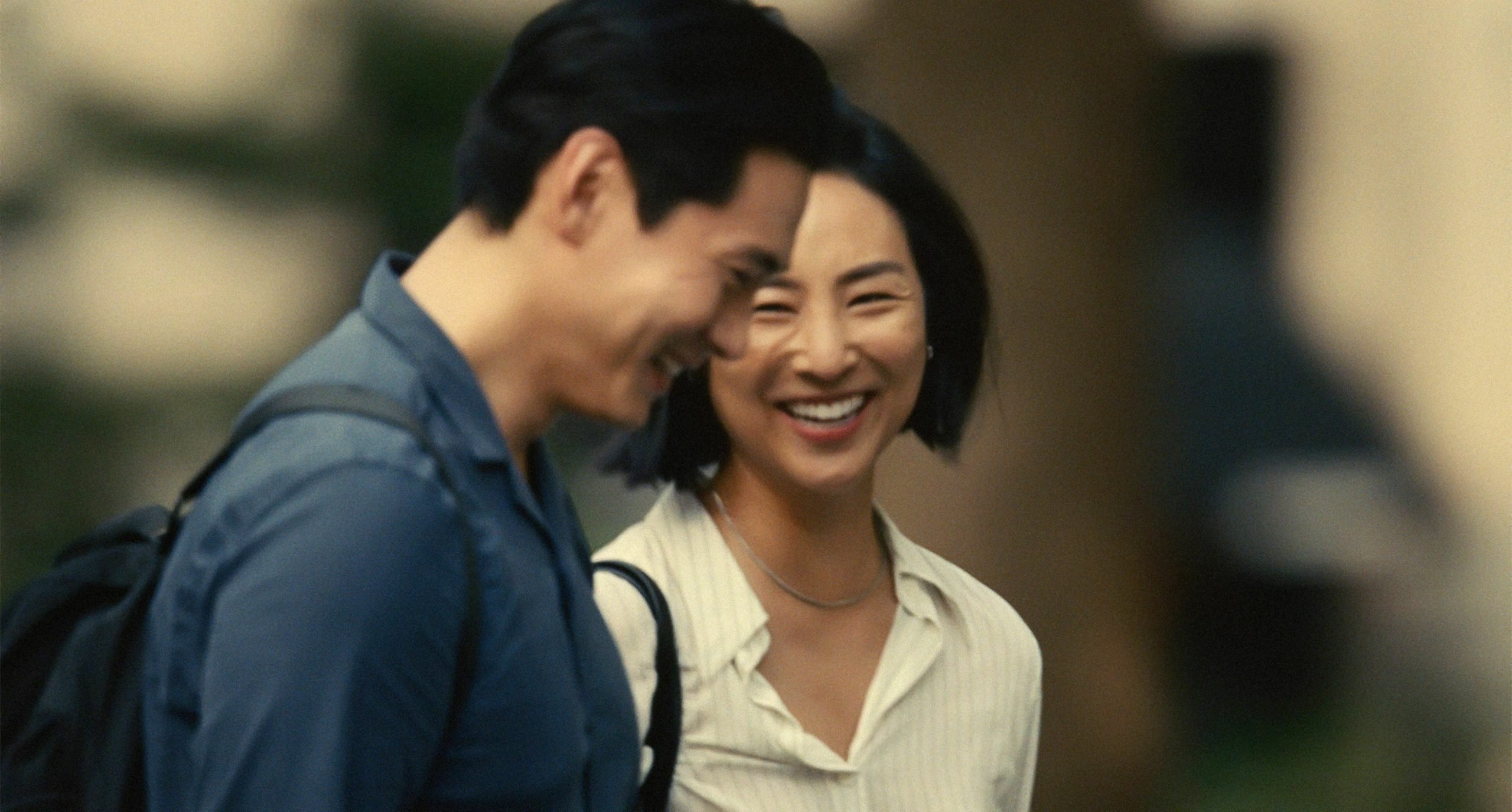“Some crossings cost you your whole life,” is a line from a play by Nora Moon (Greta Lee) an immigrant from South Korea now living in New York City via Canada. Leaving Seoul when she was twelve in 2000, Nora left behind more than her given name, Na Young, she also left behind her best friend Hae Sung who was her childhood crush and staunch defender. What Nora gave up was also a part of her identity – the Korean part of her that has become Korean-American. Somewhere there is a Na Young (Seung Ah Moon) that exists in memories and dreams that are shared with an adult Hae Sung (Teo Yoo). Nora both is and is not Na Young; that life died a kind of death with the crossing.
Celine Song’s Past Lives is obviously an intensely reflective and personal film. It is no accident that Nora is a playwright who followed Song’s own path to America. Yet, for all the autobiographical details (including her marriage to a Jewish author) Past Lives is a piece of fiction that acts like a mirror – a cinematic device she uses often through reflected surfaces in the film.
Song begins the film with some unknown people regarding a trio sitting at a bar. The trio is Nora, Hae Sung, and Arthur (John Magaro). They are trying to work out the dynamics between the three. Are the Koreans a couple? Are they siblings? Is the white guy their tour guide? Why are the Koreans ignoring the white guy? Song moves the camera to a close up on Lee’s face – Nora is inviting the audience to observe and try to answer the question that the film sets up – just who are these people and how are they connected?
Celine Song’s structure at first appears linear after the prologue but it is a beguiling mix of memories that are given breath via dialogue and well-placed flashbacks. We begin in Seoul with Na Young and Hae Sung at the age of twelve. Soon Na Young will be leaving with her filmmaker father, artist mother, and little sister for Canada. Na Young’s mother arranges for a final playdate for her daughter and Hae Sung where they create “memories,” in a Seoul sculpture garden. The two separate with a “Hey! Bye!” as Na Young walks up stairs to her house and Hae Sung continues on a low path home. Song is gently and methodically presenting her thesis to the audience – Na Young ascends, Hae Sung stays the course.
Twelve years later Nora is studying writing in New York City. On a whim she searches out some past acquaintances from Korea. She finds Hae Sung “that boy who had a crush on her” via Facebook, a now twenty-four-year-old engineering student and military recruit who had been searching for her. They begin a digital relationship (romantic, but never overtly) where their lives are played out through emails and long intimate Skype calls at all hours. Hae Sung takes Nora on virtual tours of Seoul. Nora takes Hae Sung through her life in New York City. They play with each other asking when they will each visit each other – Why would I go to Seoul? Why would I go to New York? Circumstance and real-life commitments mean that it will be at least a year before either of them can meet in person, and Nora is becoming aware that she is getting too close to an impossible romance that threatens to undo all the work she did to make it to New York and become a writer. The pull of Hae Sung is inextricably related to the pull of Korea. Laptops are closed and emails never sent. A relationship that never was (but absolutely was) is over.
Nora meets Arthur (her future husband) at an artist’s retreat in Montauk. Here she explains to him the Buddhist concept of In-Yun; the notion that there are fated connections between people throughout reincarnations. To marry someone is to have experienced thousands of layers of In-Yun through past lives. In-Yun can be a brief or profound connection, but one that cannot be broken. She laughs and says that Korean people usually use the concept before trying to seduce someone and they kiss. In five years they will be very happily married and living in an East NYC apartment. Arthur will be learning Korean so he can understand what Nora mutters in her dreams; “You dream in a language I can’t understand. It’s like there’s this whole place inside of you I can’t go,” Arthur says to her. Song’s dialogue (and deliberate lack thereof) is poetic and considered. The way she directs her camera (with Shabier Kirchner as DoP) is its own kind of poetry. Distantly observant at times but also strikingly intimate.
Nowhere is Song’s observational intimacy more prevalent than in the seemingly final chapter where Hae Sung finally makes his way to New York. Ostensibly he’s told Nora it is for a business trip, but she soon works out that he has travelled thousands of miles simply to see a person who has filled his life with her absence from it. Nora meets him in Central Park the first day it has stopped raining in his week-long visit to the city. Their eyes meet and there is the recognition of something that has kept them connected. For the first time in twenty-four years, they embrace. Nora becomes his guide to the city, and she experiences New York as a tourist. His gaze of the metropolis echoes what must have been her first experiences of it as they take the subway, go on a ferry to see the Statue of Liberty. More than often their eyes are taking in each other.
He remembers the prizes Na Young wanted to win; as a child, a Nobel, as a young adult, a Pulitzer, and now as a playwright perhaps she wants a Tony. He has never forgotten a person who Nora herself has let pass by. She exists in the now with her beloved partner who begins to wonder if their own connection was random chance. What if they hadn’t been the only two New Yorkers in Montauk? What if they hadn’t both been writers? What if they hadn’t read the same books and could give each other feedback on each other’s work? Would Nora be with some other man? The paths taken appear random, but Nora insists there is one thing that Arthur is forgetting; she loves him. He is trying not to be jealous of a man who represents the parts of Nora he feels he has no access to.
Nora is trying to convince both men that she has made choices for a reason. Yes, she misses Seoul but that is not her home. Hae Sung’s essential Korean identity makes her feel both less and more Korean. His conservative attitude reminds her of why she had to move on from Seoul and being Na Young. Na Young is a fragment of her. A fragment that both men are trying to capture but will remain as elusive to them as it is to Nora herself.
The lead performances are flawless. Greta Lee is astounding, so too Teo Yoo; and their chemistry at times almost transcends Song’s expansive frame. However, the subdued performance by John Magaro as Arthur is particularly commendable. When he laughs, somewhat half-seriously, that he would be the white guy villain in the love story between Nora and Hae Sung, a story he cannot possibly compete with, he reveals his insecurity to Nora. He also is the person who Nora will embrace when her past life once again fades away.
Past Lives is remarkably tender as a character study of three people and an exposition on the life of an immigrant in America. It isn’t really about roads not taken – how many people end up with their childhood sweetheart? How many people end up with someone who exists on a screen? There is a chance that those things can happen, but in life they are slim. Past Lives is about the people we are at different points in our existence and how we are both inextricably those people and also not those people. Such an experience has particular resonance for a person who has left their homeland to become a different person and will be forever caught in the liminality of forged identity. Past Lives is not only a breath-taking debut by Celine Song, it is a herald to an astounding voice in cinema.
Director: Celine Song
Cast: Greta Lee, Teo Yoo, John Magaro
Writer: Celine Song



